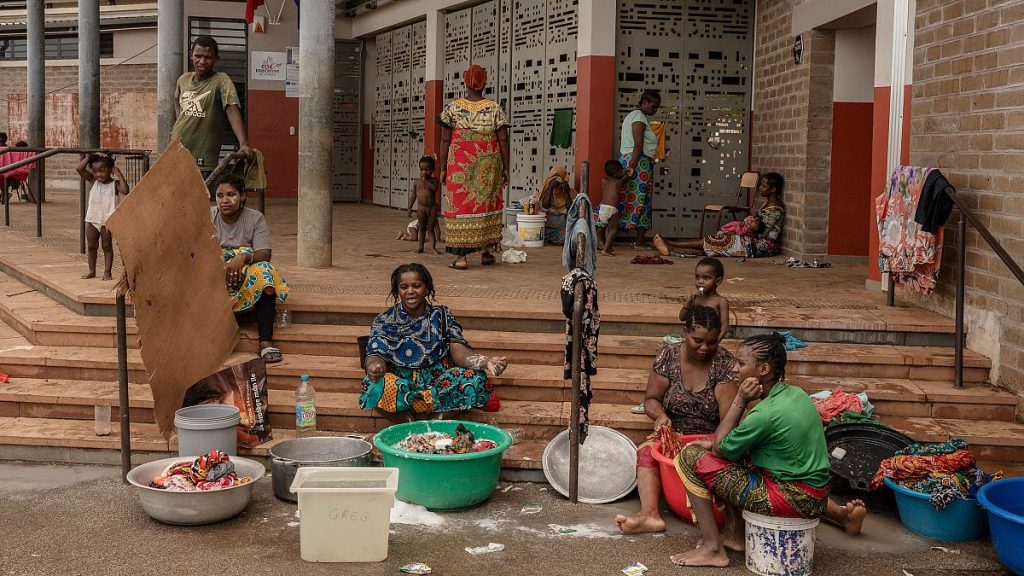The French nation paused on Monday, December 25th, 2024, to mourn the victims of Cyclone Chido, a devastating storm that ravaged the island of Mayotte, a French territory located off the east coast of Africa. The cyclone, the most destructive to strike the archipelago in nearly a century, left a trail of destruction in its wake, claiming at least 35 lives and injuring approximately 2,500 individuals. The true extent of the devastation is likely far more severe, hampered by factors such as the precarious living conditions of a significant migrant population, the rapid burial practices observed by the Muslim community, and the widespread damage that hindered access and communication. Many islanders, underestimating the cyclone’s intensity, remained in their homes, tragically contributing to the loss of life. The national day of mourning, marked by a minute of silence at the Elysee Palace with the French flag at half-mast, underscored the profound impact of the disaster on France and its overseas territories.
Cyclone Chido’s impact extended beyond the immediate loss of life. The storm crippled essential infrastructure, disrupting water and electricity supplies and severing communication lines, leaving thousands displaced and struggling to rebuild their lives. The cyclone’s destructive path reached beyond Mayotte, also affecting southeastern Africa, including Mozambique, where the death toll reached 94. This widespread devastation highlighted the vulnerability of these regions to extreme weather events and the urgent need for effective disaster preparedness and response mechanisms.
The national day of mourning underscored not only the tragic loss of life but also the complex relationship between France and its overseas territory. Mayotte, France’s poorest department, has long grappled with issues such as poverty, a large migrant population, and limited infrastructure, making it particularly vulnerable to natural disasters. The cyclone’s impact brought these pre-existing challenges into sharp relief, exposing systemic vulnerabilities and raising questions about the adequacy of support provided by the French government.
In the aftermath of the cyclone, French President Emmanuel Macron visited Mayotte to assess the damage and offer support to the affected communities. His expression of solidarity, conveyed through a message on social media, emphasized the nation’s collective grief and commitment to supporting the island’s recovery. However, this expression of national unity was accompanied by criticism from some quarters, particularly from Mayotte lawmaker Estelle Youssouffa, who accused the French government of neglect and insensitivity. Her criticism centered on the timing of a potential cabinet reshuffle, which coincided with the national day of mourning, suggesting a perceived lack of genuine concern for the plight of the island’s population.
Youssouffa’s pointed critique highlighted a simmering discontent within Mayotte regarding its relationship with the French government. Her accusations of neglect, amplified by the backdrop of the national day of mourning, underscored the perception of a disconnect between the official expressions of solidarity and the lived reality of the island’s residents. This tension between national unity and localized grievances further complicated the response to the cyclone and raised important questions about the responsibility of the French government towards its overseas territories.
The declaration of a national day of mourning for the victims of Cyclone Chido marked a significant moment in French history. It was the first such declaration in response to a climate-related disaster since the establishment of the Fifth Republic, signifying a growing awareness of the impact of climate change and the need for a national response to such events. Previous national days of mourning were primarily declared in response to the deaths of former French presidents or victims of terrorist attacks, underscoring the gravity of the situation in Mayotte and the recognition of the cyclone as a national tragedy. The event serves as a somber reminder of the increasing threat posed by climate change and the need for global cooperation in addressing its devastating consequences. The tragedy in Mayotte stands as a stark warning of the human cost of climate change and the urgent need for collective action to mitigate its impact and build more resilient communities.










